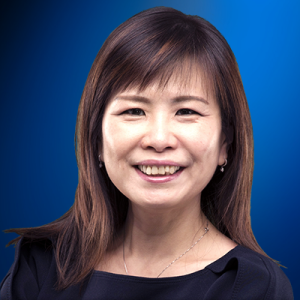Phillip Thompson, Vice President Global Growth, Client Services and Marketing at Kepner-Tregoe, recently had the opportunity to interview Sim Cher Whee, a seasoned professional who shared her career journeys, challenges, and achievements. In this interview, we explore the insights and experiences of Sim Cher Whee, a successful leader in the semiconductor industry, and discover her tips for navigating the complexities of career growth.
Women have a unique perspective and valuable contributions to make, and it is vital to believe in oneself and not be afraid to speak up and assert oneself
AS we approach 2030, the anticipated talent deficit underscores the need to build an inclusive workplace, and it is crucial to delve into the importance of diversity and inclusion in the workplace.
One of the biggest challenges facing women in leadership today is the persistent gender bias and stereotypes that still exist in many organizations and industries. Despite progress in recent years, women still face significant barriers to advancement and are often held to different standards than men.
Sim Cher Whee shares her personal journey, beginning with her experience as one of only five women in a cohort of 100 engineers. Despite the initial challenges, she persevered and now works in a company actively committed to increasing representation from underrepresented groups.
Cher Whee believes that women bring a unique perspective and valuable contributions to the table, and it is crucial for them to believe in themselves and speak up with confidence.
Her advice to them is to stand their ground, seek mentorship and sponsorship, and continually learn and adapt to industry developments.
“My advice would be to believe in yourself and your abilities, and to not be afraid to speak up and assert yourself. It’s easy to feel intimidated or marginalized in a male-dominated field, but it’s important to remember that you have a unique perspective and valuable contributions to make”.

Sim Cher Whee – VP, Global Talent Acquisition, Mobility, and Immigration at Micron Technology
In this Q&A, we explore the challenges faced by women in male-dominated industries and discuss strategies for overcoming them, as well as ideas on how to maximize potential and promote equal opportunities for professional development, from entry-level positions to the boardroom.
Q: Can you tell us a little bit about your background and how you got to where you are today?
A: I am Sim Cher Whee, Vice President for Global Talent Acquisitions, Immigrations and Mobility at Micron Technology. I have been in the semiconductor industry for over 30 years.
I started my career in engineering at TECH Semiconductor Singapore, which is now Micron. I then moved into other roles including finance, technical training, learning and development, and finally, human resources. My current role is global and based in Singapore.
Q: What inspired you to pursue a career in the semiconductor industry?
A: I was always interested in science and engineering. When I was in school, my science teacher recommended that I consider studying STEM courses. I then went to the National University of Singapore to study chemistry.
After graduation, I joined TECH Semiconductor Singapore, which is now Micron. I was attracted to the industry because of the fast-paced nature of the work and the opportunities for innovation.
Q: What are some of the challenges you faced early on in your career, particularly as a woman in a male-dominated field?
A: When I started out in my cohort of engineers, there were only five women out of about 100 engineers. It was challenging to be so underrepresented and have our voices heard.
Additionally, there were some learning opportunities that were not available to women. For example, when I was training in Japan, a lot of the learning took place over drinking sessions in the evening, which I did not feel comfortable participating in.
I realized that whatever I do in my career, whether I continue in the semiconductor industry or any other industry, there needed to be a change. I made a commitment to myself to increase female representation in the industry the near future.
Q: What advice would you give to women who are just starting their careers in male-dominated fields?
A: I would advise them to have a growth mindset and be willing to embrace failure. Challenges are opportunities to learn and grow.
It’s also important to build a strong support network and find mentors who can provide guidance and support.
And remember to be confident and speak up. Your voice is important and can make a difference.
Q: How do you approach diversity and inclusion in your role as VP of Global Talent Acquisitions, Immigrations and Mobility?
A: At Micron, we are committed to building a diverse and inclusive workplace. We set goals to increase representation of underrepresented groups, including women and people with disabilities.
It’s also important to measure progress and hold ourselves accountable for creating a more diverse and inclusive workplace. We also believe in building diverse teams, which can drive innovation and creativity.
Q: Can you share a time when you had to navigate a sensitive issue related to diversity and inclusion?
A: As top management, I am often dealing with sensitive issues related to diversity and inclusion. One example is when we had to navigate a situation where an employee was facing difficulties with his visa.
We had to work closely with Immigration to ensure that we were following all the necessary protocols and providing the employee with the support they needed.
We also took steps to ensure that we were creating a supportive workplace culture where all employees felt valued and included.
Q: How do you approach problem-solving in your role?
A: In problem solving, I believe in asking questions and seeking diverse perspectives.
By bringing together individuals with different backgrounds and experiences, we can generate new ideas and perspectives that can help drive innovation and creativity.
I also believe in taking a holistic approach to problem solving, considering all the different factors that may be influencing the situation.
Q: How do you ensure diversity and inclusion in the talent acquisition process?
A: It’s important to set goals. When you look at talent, if you just look at those you know and who apply, you might not be able to get that diversity right.
Diversity is extremely important because it influences the voice, the ideas, and the way that we go about doing things.
Just last year, when we looked at every hundred new hires, at least 40 were from an underrepresented group. This includes women and people with disabilities. I encourage building a future workplace that realizes the fullest potential of talent.
Q: How do you handle situations when your team isn’t in agreement with one another?
A: I know that if everybody thinks alike, someone is not thinking. For example, if a group of people from different countries, different backgrounds, and different experiences listen to a proposal and then everybody agrees with it, something is wrong. Sometimes I tell them, I think this may need a little bit more thought, and we’ll reschedule a time to talk about it. As a leader, I need to be very intentional. I need to ask questions; I need to ask for help. I will not be able to understand if I just listen without asking any clarifying questions.
Q: How do you handle failure and mistakes?
A: Whatever you know that you didn’t do well, admit it. More importantly, also propose how it could be prevented. I continued to raise my hand for many other things and was able to demonstrate that I could learn quickly and act effectively. I believe that failure is not falling down, it is staying down. I encourage everyone to take risks, have courage, and be willing to learn from mistakes.
Q: How do you encourage others to ask questions and facilitate building questioning skills?
A: I encourage my mentees to ask clarifying questions. I believe in really facilitating building questioning skills. When they come to my sessions, sometimes I facilitate this by intentionally presenting a biased or limited viewpoint.
If they don’t ask me questions, I will ask them were you comfortable with how I answered? What was missing in my answer? How was I not thinking holistically? It’s important to do your homework and really think about what you want to ask.
It’s a trainable business skill but there’s no value in asking for the sake of asking. And I really dislike questions that put other people down. If that happens, I suggest rephrasing it. It’s important to be respectful.
Q: How do you balance your personal and professional life?
A: You have to make a choice, and sometimes that choice is hard. My family has been my support structure and the foundation of my life. I’m blessed with two amazing children who are very supportive of my career.
You have to learn to communicate with your family, and I believe that communication is key to success in both personal and professional life. You need to have a level of clarity and transparency in your communication, whether it’s with your parents, your children, your colleagues, or your boss.
Q: What advice would you give to women who aspire to leadership positions in male-dominated industries?
A: Have courage, take risks, and be willing to learn from mistakes. Don’t be afraid to ask questions, and be intentional about building questioning skills. It’s important to surround yourself with a good support structure and to communicate clearly and transparently with your family, colleagues, and bosses.
Don’t be afraid to set goals and work towards achieving them. And finally, always remember to believe in yourself and your abilities.






